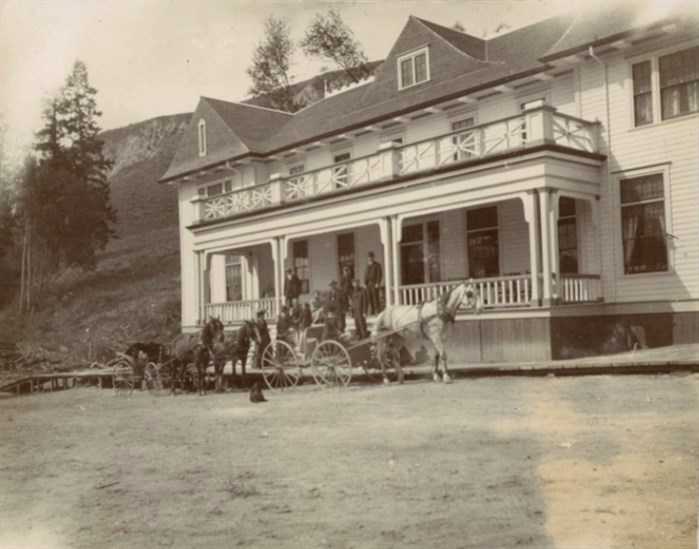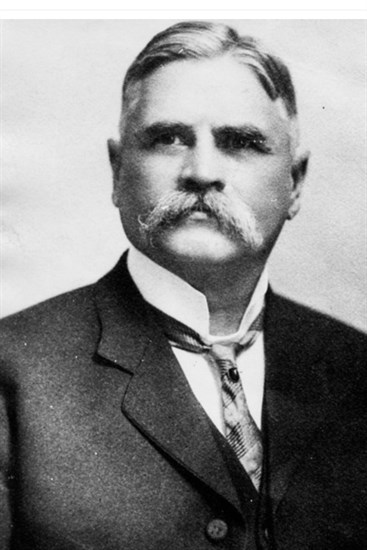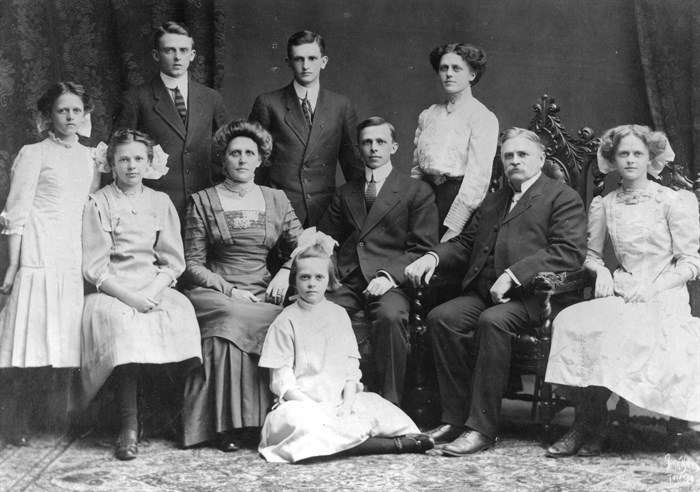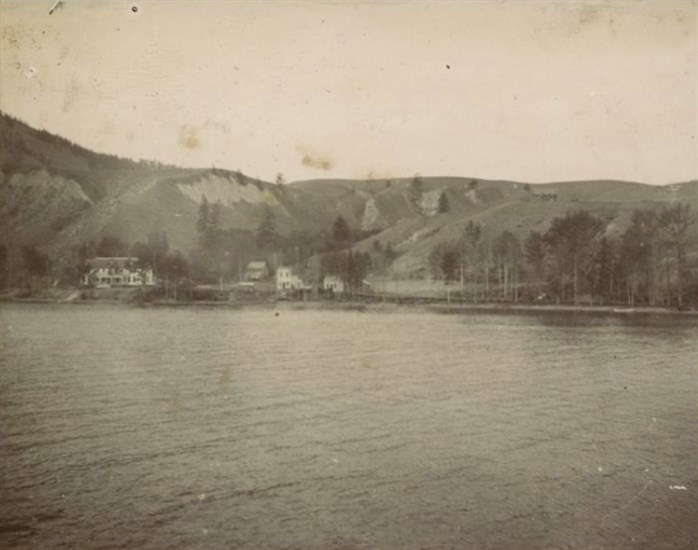
The JM Robinson house in Naramata in 1903.
Image Credit: Submitted/Naramata Museum
May 14, 2023 - 6:00 AM
It all started with a peach.
From that one delicious bite, John Moore (JM) Robinson started off not only naming three Okanagan communities but building an empire for himself that was only open to the kind of people he liked.
He named Peachland, Summerland, then, Naramata more than a century ago.
In a 1912 brochure extolling the virtues of Naramata, he put his true colours in writing as he praised the benefits of the community.
“In it he says, for instance, you would not wish to find yourself surrounded with garlic-eating, foreign-speaking neighbours with whom you could have nothing in common,” John Verde, a volunteer with the Naramata Museum who is researching Robinson, told iNFOnews.ca.
“He said this is an exclusive community and we do not want riff raff from Kelowna coming through here,” Brian Wilson, archivist with the Okanagan Archive Trust Society, told iNFOnews.ca. “That’s exactly what he said.”
He was referring to efforts by Kelowna residents to build a road through Wildhorse Canyon, in what is now Okanagan Mountain Park, to Naramata out of frustration over poor ferry services in the late 1920s.
“He had what he called the Happy Gang, which was three thugs, so that if you wandered into Naramata and didn’t have any business there, they would kick you out,” Wilson added. “This was a very exclusive, God-fearing, British colony for only those who were friends of JM Robinson.”

JM Robinson.
Image Credit: Submitted/Naramata Museum
The man was born to British parents in Ontario in 1855.
He rose to prominence in Manitoba where he started off as a teacher but went into the real estate business and became a newspaper man, including founding the Brandon Times in 1886. He was elected to the Manitoba legislature that same year.
Around 1893 he founded the Canadian-American Gold Mining Development Co. Ltd. in Rossland, BC and, in 1897, he made a 500-mile horseback journey into the Okanagan where, Verde said, he staked 24 claims and started the short-lived Gladstone Mine near Headwaters Lake above Peachland.
READ MORE: iN VIDEO: How 'Canada's biggest water system' took Vernon from cattle to fruit
At the end of that summer, he headed down to Peachland (then called Camp Hewitt) to catch the paddlewheeler to Okanagan Landing on his way back to Rossland.
“In the 1920s, he writes about how he arrived in Camp Hewitt and had dinner and was fed peaches and he goes: ‘Holy cow! These are awesome. Where did they come from?’” Verde said.
He was told they were grown right there by Robert Lambly.
“He goes on to say he couldn’t sleep that night thinking about how this was such a great idea to turn dusty cattle ranching country into greenery and orchard growing,” Verde said. “The motivation for him was all the people he knew back in Manitoba who were retiring and moving to California and taking their capital with them because they couldn’t handle the winters back in Manitoba.”
Robinson bought 30 acres from Lambly. In 1899 he created the Peachland Townsite Company with family and friends who bought up a “significant amount of property” in what was now Peachland.
From there he moved further south to found Summerland.
But, while Verde thinks Robinson did well financially in Peachland, he didn’t have the resources to develop Summerland so, the Summerland Development Company that was formed in 1903 and had him as president, was heavily financed by Sir Thomas Shaughnessy, president of the CPR.
Shaughnessy, himself, was no fan of diversity.
“Shaughnessy came into Penticton first and was astonished by what he called the 'wrong kind of people', the cowboys and the tremendous amount of Chinese that he didn’t like at all,” Wilson said. “Summerland was just a naked piece of property that was a sawmill, basically, for James Ritchie.
“Robinson was brought in from Peachland, he and his brother, to be managers of the company while Shaughnessy was away. They made a tremendous amount of money at it but they were not the biggest landholders there."

JM Robinson family photo, 1908.
Image Credit: Submitted/Naramata Museum
The problems for Robinson in Summerland were two-fold.
“He was very famous for his parties but had to move out of Summerland because he loved to drink and Summerland was dry,” Wilson said.
The other thing was that most of the land there had been preempted years before and, with reports of a rail line coming in, Robinson was not able to get in on the ground floor as a major landowner.
“When it was decided the railway was not going to come into the centre of Summerland but was going to come close to Naramata, he changed his ideas so he went across the lake,” Wilson said. “This was all politics. It was big politics.”
READ MORE: iN VIDEO: That '70s documentary of Penticton graduation
Verde understood that Robinson bought 3,000 acres from Tom Ellis, the cattle baron with herds ranging from the US border to Naramata.
From Wilson’s research, that was not the case.
While Ellis had most of the land in the Naramata area, there were three preemptions that he was not able to get.
That land, Wilson said, was a gift from the federal government to the CPR to pay for the building of the Kettle Valley Railway.
Ellis was friends with the railway's chief engineer Andrew McCulloch.
“McCulloch gave him the wink and said you better make some effort to cash out on this stuff,” Wilson said.
That Robinson did, buying up the available land and founding Naramata in what was then called Nine Mile Creek or Nine Mile Point.
He changed the name to East Summerland then Brighton Beach before a medium came up with the name of Narramattah (which he shortened to Naramata) during a séance where she reportedly communed with a First Nation man.
READ MORE: Spiritualists, Japanese warlords and mispronounced words: Where the Okunaakan got its names
“Naramata was going to be a tourist destination in his mind,” Verde said. “Land development for orchards was one thing. The arts, theatre, regatta and a tourist hotel, that was what he envisioned. Unfortunately, World War I got in the way and the Coney Island aspect never did take off.”
But there were regattas, featuring the Robinson Cup war canoe race, a 2,000-seat gallery beside his hotel with boxes for dignitaries and, of course, parties.”
While he was highly respected and supported many charities, he was also a calculating businessman who was determined to control everything.

Naramata, undated.
Image Credit: Submitted/Naramata Museum
“If you look at the aerial pictures of Naramata, everything you see belonged to him – the bandstand, cottages, guest suites, bottle works, packing houses, the school, the mercantile, the bank, the post office,” Wilson said. “Everything belonged to JM Robinson.”
He brought in boat builders and pilots so he could control the ferries in the triangle between Naramata, Summerland and Penticton and set up his own bottle plant so he could have seltzer with his whiskey, Wilson said.
“Robinson was always keen on having an exclusive community,” Wilson said. “He owned all the land in Naramata and only allowed bits of it to be carved off for specific people that he brought in to run the orchards.”
READ MORE: iN PHOTOS: Absentee owners a hallmark of historic Coldstream Ranch
Wilson referred to Carroll Aiken as an example of the types of people Robinson wanted to surround himself with.
“He had no business sense,” Wilson said about Aiken. “He was a playwright so what does he do? He opens a theatre in Naramata and he brings in theatre students from back east to work on the farm and then learn theatre from him in his packinghouse. So, the upper part of the packing house was actually a live theatre. That was the kind of thing that Robinson liked.
“Those are the kind of rich, exclusive things you have to weigh in Naramata. Naramata was the exclusive, rich people’s resort that it is even today.”
To contact a reporter for this story, email Rob Munro or call 250-808-0143 or email the editor. You can also submit photos, videos or news tips to the newsroom and be entered to win a monthly prize draw.
We welcome your comments and opinions on our stories but play nice. We won't censor or delete comments unless they contain off-topic statements or links, unnecessary vulgarity, false facts, spam or obviously fake profiles. If you have any concerns about what you see in comments, email the editor in the link above.
News from © iNFOnews, 2023